The impact of COVID-19 on the travel sector
Considering the impact Covid-19 has had on the travel sector so far, it’s likely that many hotels, accommodation providers and travel companies are having to deal with some very serious operational issues in what are fairly exceptional circumstances.
It’s probably a given that many of them are also being forced into taking a long-term view to much of their investment in marketing – and that’s only if they’re able to survive during this period.
There’s little point trying to drum up business when people literally can’t travel, and most of the world is in some kind of self-isolation or in an imposed lockdown.
I’m not a huge believer that *right now* a massive investment in SEO for a hotel is a necessary cost. I see others within the industry saying the complete opposite, but I think that’s more of an operational decision to be made by the business – and not one that I would want to push, considering how badly hit these businesses will be.
With time the impact will of course subside and very slowly life will start to return to some form of normality (albeit with some lasting changes) – and people will continue to travel and will need a place to stay. Perhaps holidays will be more needed than ever, although there’s sure to be a hit taken on consumer confidence after what’s gone on.
Until then it is clear that hotels, accommodation providers and travel companies will need to take a long-term view in order to stay competitive. For me that does involve some form of SEO work.
So for some businesses SEO investment may still be the most cost-effective solution to their issues – and for the right company I would agree. But unfortunately SEO might not be the silver bullet solution that some slightly dubious companies may lead you to believe.

Screenshot showing YoY review of a 300-room hotel in the US – traffic, conversion rates are all dipping sharply, showing the harsh impact of Covid-19 on their business so far.
SEO rules within the hotel landscape (from 5+ years working in the sector)
I’ve been lucky enough to have worked within a few travel companies to date, carrying out SEO and PPC services for many types of hotels around the world. From my experience it is quite a different industry to work in (but then again everyone probably says the same about their own sector, they all seem to have their own quirks!).
Hotels normally have a few consistent requirements from organic and paid search channels: generating bookings at their hotel being the main one. Other supplementary goals may include hiring out a hotel’s meeting facilities or their wedding venue facilities.
The main point of friction for a hotel relates to those pesky online travel agents (OTA’s) – who do such a great job of selling all the rooms a hotel has that they often leave the hotel with few rooms left to sell themselves. Sites like Booking.com and Hotels.com take availability (rooms) from a hotel, and they sell it direct to the consumer through their own website and other channels, taking a hefty chunk of the sale in a commission.
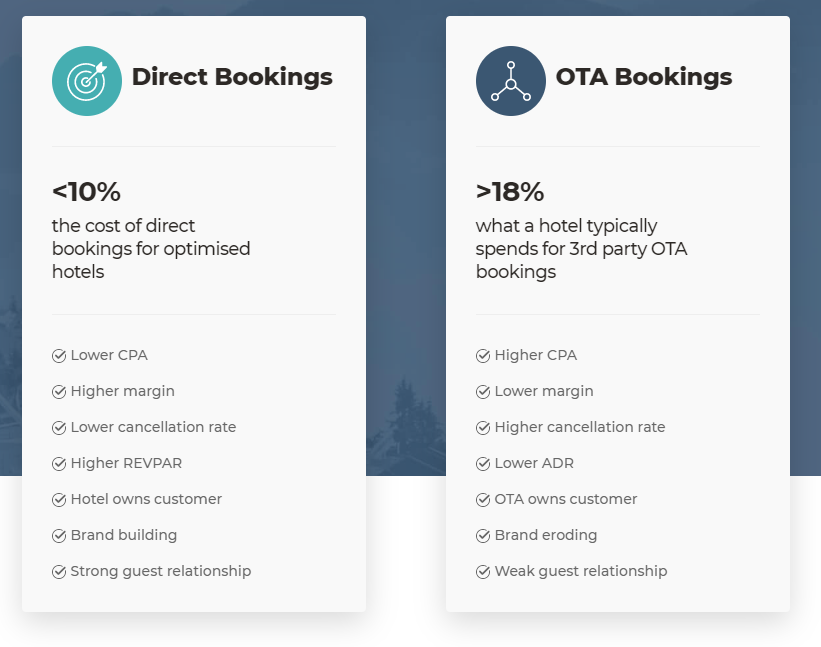
A graphic from leading booking engine provider Bookassist, showcasing the value of chasing Direct Bookings vs selling through an OTA like Booking.com.
For hotels it’s often far better for them when they are able to sell their rooms direct through their own official website – where they pay far less* (or 0%) commission when they are able to do so, versus paying out 30%+ when a room is sold through an OTA.
So – hotels want people to book direct with them**, and in order to do so they need to bring more people to their website.
*Note – a small commission fee may be paid even when the booking is direct because the booking-engine provider often charge hotels a small percentage as a fee which goes towards their own operating costs.
**Some hotels are understandably reluctant to adopt this mindset – they are fearful that by turning away from the OTA’s, their revenue will drop heavily. Or, they fear that they aren’t able to market their property well enough to sell the required rooms at their property – OTA’s are an easy, safe option.
Whilst search engine optimisation doesn’t often get the biggest chunk of a hotels marketing budget, especially since Google’s changes to the SERP that further enforce the need to invest in multiple Google Ads products, that doesn’t mean SEO should be neglected completely.
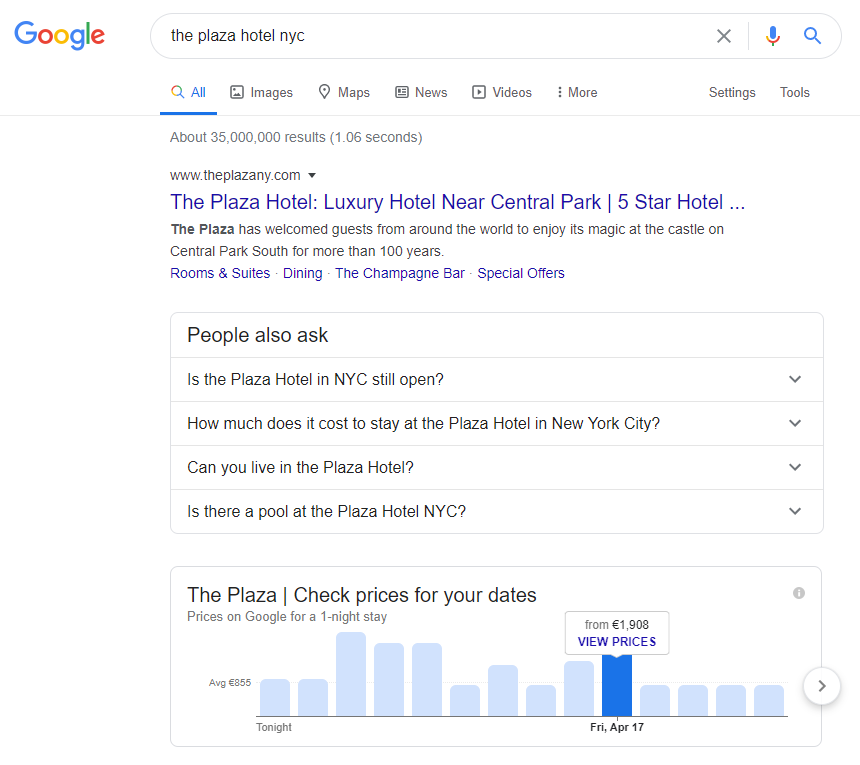
Showing the Google-generated rate checker – encouraging users to enter their dates or to choose the day when prices are lowest for this particular property (clicking a day takes you to a Google Hotel Ads page).
Key SEO factors for a hotel website – take stock and reassess performance
At most of the hotels I have worked with, organic search still provides the main bulk of traffic and revenue, often amounting for approximately 70% of their overall direct web bookings.
Right now, due to Covid-19, many hotels are pulling back entirely on all PPC activity which makes good sense to me. For those who can afford to maintain an SEO presence or who can manage it in-house from the resources they have available, this article might help point them in the right direction.
In other words – based on current world events, now might be a good opportunity to take stock and reassess how your hotel is performing on the likes of Google, and to try and predict what the next few months are going to look like.
Typical questions you might want to begin asking yourself at this point of forced self-reflection include “What exactly does a branded search look like for my hotel” (which I cover in more detail later on) and “Which non-brand search terms have been driving the most traffic and bookings over the past 12 months?” And then – how can you improve the branded search results, and double-down on non-branded terms that are converting best for you?
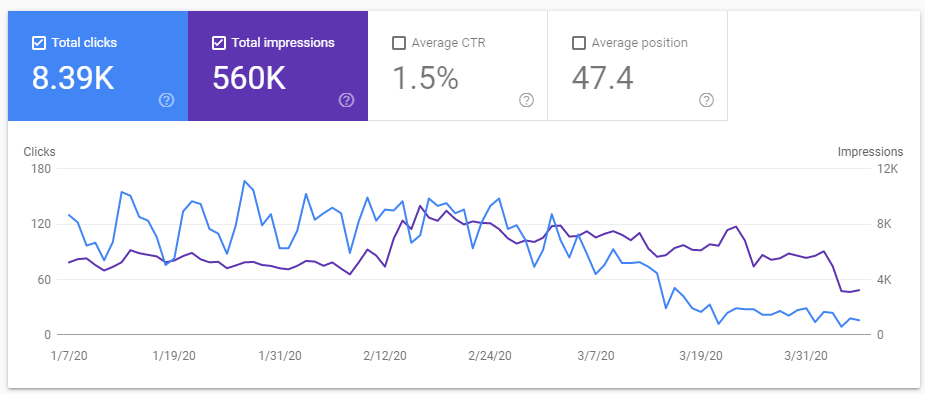
Sad but practically unavoidable – the drop of organic traffic to a hotel website, based on the impact of Covid-19 on travellers’ search behaviour.
Branded SERPS
Assessing how the search results (SERPs) appear for a branded hotel query is a simple task you can carry out to spot any serious issues (the biggest one being: does my hotel website rank 1st here or not?) and checking how your PPC search ads are looking – when they’re active, as they likely aren’t visible right now due to Covid-19.
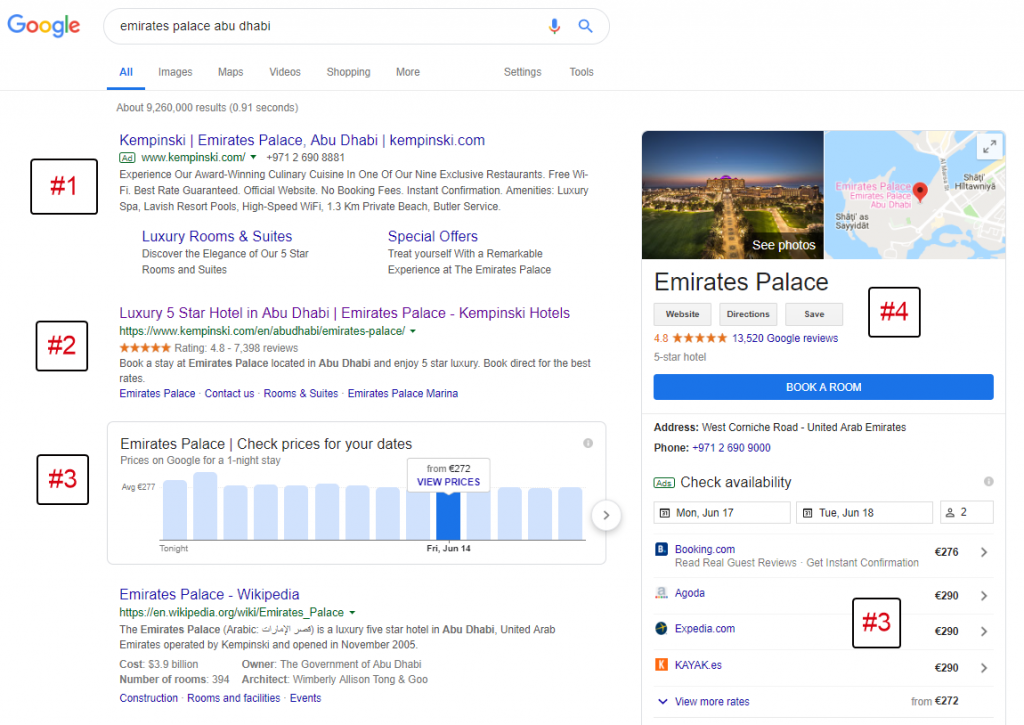
#1: Branded search ads being run by the hotel (Google Ads search)
#2: Organic search listing belonging to the hotel
#3: Rate overview and daily rates provided – note rates from the official hotel aren’t displayed here (Google Hotel Ads)
#4: Hotel information (Google My Business & other sources)
You should keep in mind that your website’s branded SERP will look different depending on many different factors, including:
- Location: different information may be shown depending on where the searcher is located
- Device: the mobile, tablet, and desktop branded SERP might all be very different
- Search engine: particularly if your hotel gets lots of visits from a region where Google does not have such a high market share, you should check to see what your branded SERP looks like in other search engines.
Website crawlability
Bots, which search engines use to find your pages, uncover all the content available on your site by crawling from page to page and discovering content on any URLs it can find.
You should make sure your site offers the right information to bots to build a great SERP listing, from page titles to fixing any broken links. You also want to make sure that your key pages can all be discovered in a crawl: if Google can’t find them, neither can your customers.
Use of images and video content
Image and video really need their own section here as they are so vital for hotels – they make such a big impression on any visitors to your site because travel is such an emotive experience and images/video are of course very visual!
Whilst you hopefully don’t want to force all your visitors to watch a lengthy intro video when they first hit your homepage (especially not with full-blast audio enabled), you can still make use of video content to give your site a real wow factor – which is needed if you want people to remember your hotel.
Don’t forget to ensure your site is accessible for all users, whether they are using old browsers, slow connections, or visual aides like screen readers.
Your hotel’s Google Search Console data
The Search Console performance report can provide you a list of keywords your site is ranking for. These are the searches your customers have been entering in Google which have resulted in your website being displayed as a result. This is vital information that you should be aware of – and is the kind of info your SEO agency/consultant should be sharing and reviewing on a regular basis.
Pinpoint any search terms where you have a high impression count but low number of clicks – probably due to a low average ranking position.
From this report you can also see the general health of your hotel’s brand awareness.
Filter by your hotel name to find out how many people are searching for your hotel name organically and then find out what this is like throughout the year to be used as a benchmark for future reference.
You can even segment this data by country to find how it varies – which may be important for international SEO.
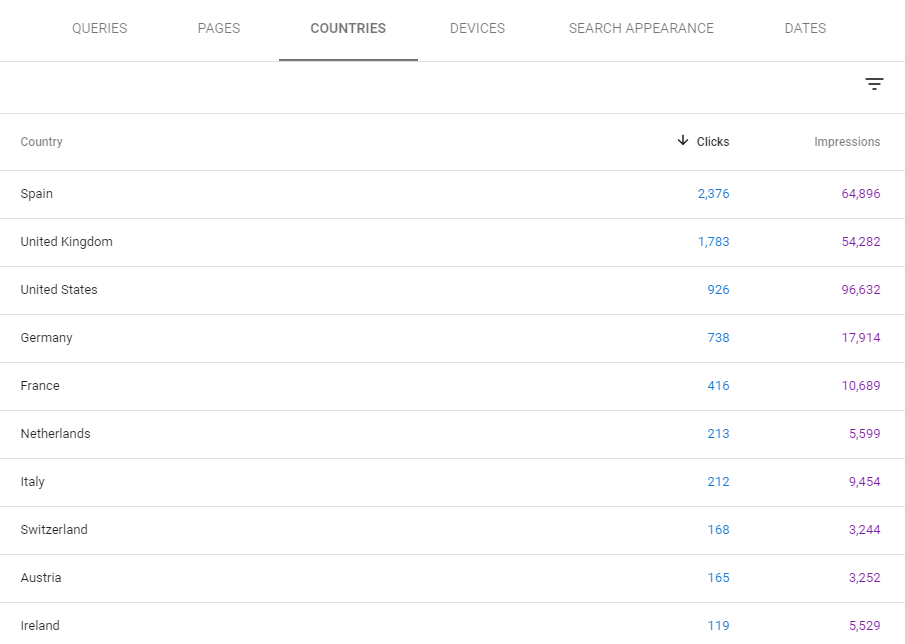
Organic traffic by country in Google Search Console for a hotel based in Spain.
Website Reporting data
Google Analytics or another reporting solution will also give you an important view of what’s happening on your website.
As well as giving the ability to analyse user behaviour whilst on your website, this might also help flag potential issues – such as pages that should be getting more hits but which aren’t, bottleneck pages that don’t seem to load fast enough, or even sites that are getting hit with spam traffic which inflates figures and eats up valuable server resources.
Your Google My Business profile
Optimising your hotel’s Google Business profile has become a crucial part of a successful search marketing strategy. It’s now vital to ensure it’s completed in full and well optimised – with a clear strategy in place to consistently collect reviews from guests post-stay.
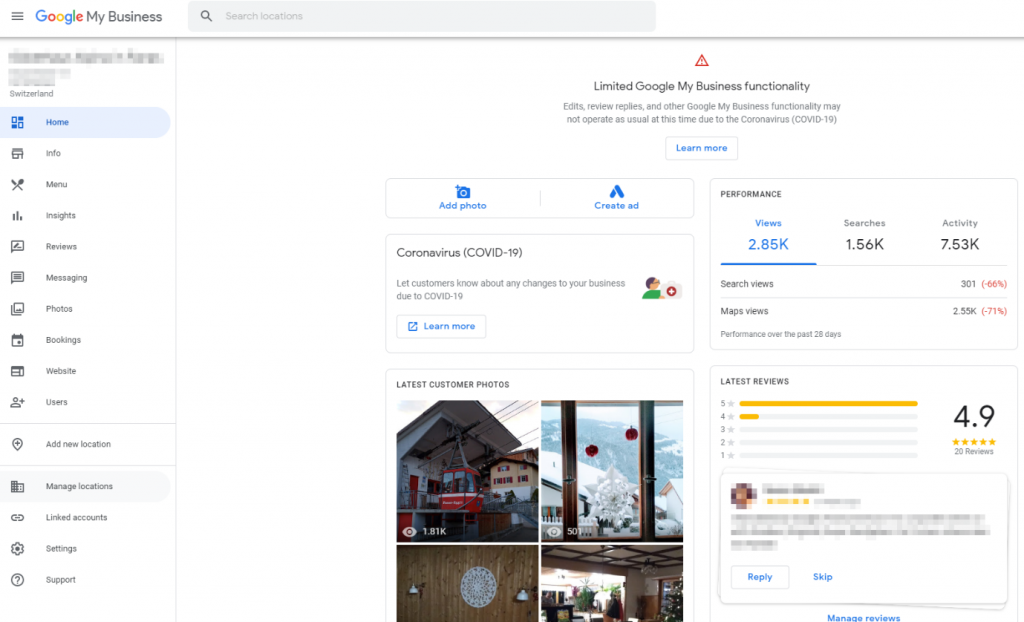
Showing the Google My Business interface for a hotel/restaurant based in Switzerland.
Mobile friendliness
Since Google’s switch to mobile first indexing last year it’s become essential to ensure your hotel site works well across all types of devices.
Site speed and page load times
To keep things simple you want to make sure your site is as fast, or faster than, any of your hotel’s compset. You should know these sites well enough, and having a list of 5 or so rival hotels is a big SEO asset as it can help you to benchmark organic progress vs them – as well as picking up handy tips on content you may have missed.
Use of structured data
Structured data, also known as schema markup, allows search engines and other tools to be able to understand more data within a web page.
Whilst search crawlers traditionally read and understand the content on a page, structured data is a specific markup language that allows you to explicitly give more information about your business, in this case your hotel.
Typical structured data that a hotel can make use of right now include the Hotel Schema, which exists within the local business schema, where you can supply such details as the hotel name, amenity info, whether the hotel is pet friendly (that’s a fairly new one), and many more.
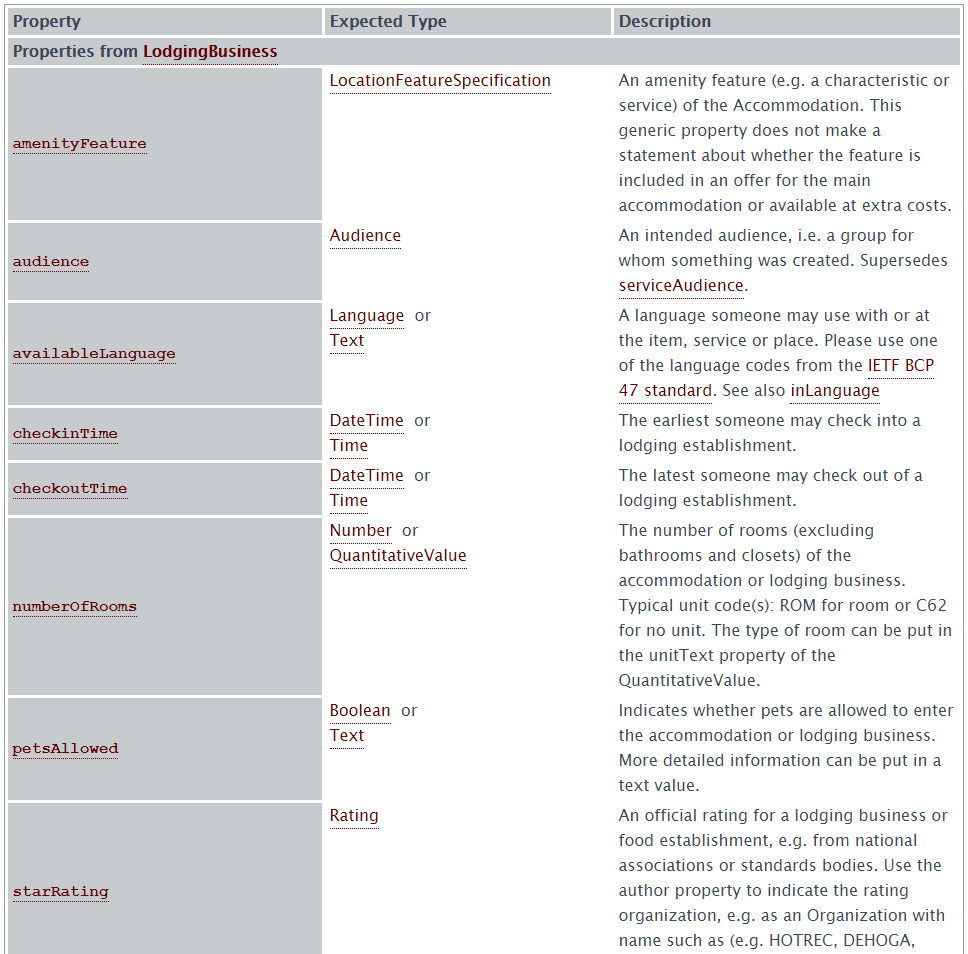
Example of the Hotel Schema markup, showing some of the info you can use within your structured data
To give another more tangible example of the benefit of schema markup you can see a SERP for the below in Google. Whilst this isn’t showing an example for a hotel, it hopefully still does show the power of structured data as being utilised by TripAdvisor for a branded search query.
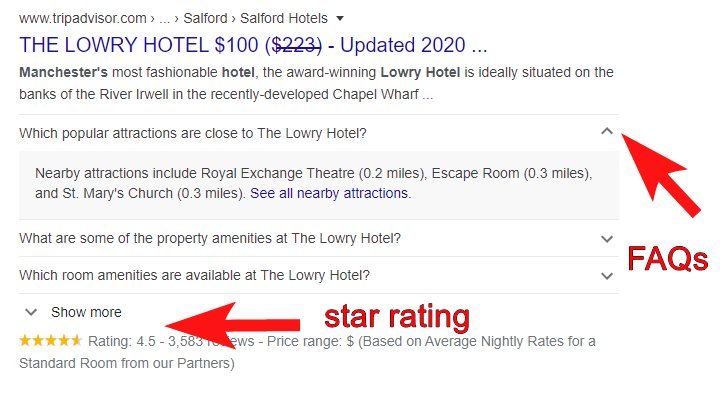
Structured data example showing the use of markup for FAQ’s plus the review rating snippet.
You do need to be careful about how you choose to markup review snippets here for a hotel. I once received an automated “structured data penalty” from Google for using it in a way that they didn’t approve.
I had been marking up reviews that had been collected on the hotels Google business profile, not reviews that they had collected independently.
So, sadly some of the benefits of rich snippets aren’t available to independent hotels.
I also can’t mention structured data without also mentioning Featured Snippets – where you have the chance to grab what’s known as “position 0” within the SERP.
This is the result Google surfaces for queries that they believe can be answered directly within their results.
There’s a love-hate relationship with featured snippets in the SEO community – some love it, as it’s a great opportunity to get good coverage for your site. Others hate it and see it as Google “stealing” clicks from your website.
Whatever you think about featured snippets, if you can hold the top, position 0, then you will see lots more impressions and clicks through to your site.
For a hotel I think you’re limited in opportunity here – whilst you can answer specific questions about your hotel (“is there parking at the hotel xyz in London?”) you may not be able to be featured for much else.
That’s not to say that if you have a blog, and you do a good job with your content strategy to craft things that potential customers may be looking for, then you can still do very well from it.
Your backlink profile
As a disclaimer here, I’m not sure that having a huge backlink profile as a hotel is as important for your organic rankings as it is within other industries.
I think that NAP citations (when your hotel is mentioned elsewhere on the web without a link) can count to be just as beneficial.
If you think from Google’s perspective, why should it rank hotels organically based on the number of links they have on the web?
It’s far better for them to show the hotels that they are confident match the search intent shown by the user.
I realise links will still be a part of Google’s algorithm when it comes to ranking hotels organically (Google likely chooses to crawl sites more often which have a higher link count vs others) but I don’t think you absolutely need an amazing link profile in order to rank well.
For that reason if I was a hotel I would be investing efforts elsewhere and not chasing links. I think that as a hotel your time is better spent ensuring you are extremely visible throughout the research and booking phases.
Next steps: audit and assess
Once you understand this framework of elements that can help you stay on top of this competitive search landscape, the next step is to audit your hotel’s website.
Stay tuned – I’ll be providing further information on how to assess each of these points and a Google Sheets checklist template for hotel SEO in an upcoming post.

